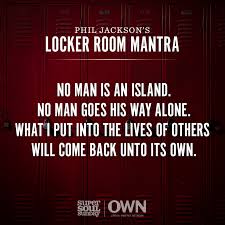In this inspiring Super Soul conversation with Oprah, Phil Jackson, called the Zen Master and greatest basketball coach of all time, shares his journey as a seeker and how he used his background in Christian mysticism, Native American Rituals, and Zen Meditation as guiding principles for his work as a coach.
What resonated!
- Spirituality means trusting in one’s own intuition and having the courage to lead from a place of authenticity. That is, leading from the inside out versus following someone else’s leadership rules.
- Spirituality is also about esprit de corps, the spirit among a connected group of people, the idea that we’re in this together.
- While it takes the right mix of talent, creativity, intelligence, toughness, and luck to win a championship, LOVE is the most essential. He talks about the circle of love – that everyone needs to sacrifice and give a little more of themselves in the process of bonding and becoming a unit.
- Leadership is about making everyone else a little better, but a leader has to create the space for others to step in and be bigger than themselves (case in point, Michael Jordan’s acceptance of this role).
- His admiration of Pema Chödrön’s concept: “What you do for yourself, any gesture of kindness, gentleness, honestly, and clear seeing toward yourself, will effect how you see the world” and use of it as a key building block in his work as a coach.
- In addition to building physical strength, he stressed the importance of building mental strength through mindfulness and meditation –one breath, one mind.
- How morning meditation allows him to start the day at peace and with a quiet mind – and that he is always capable of coming back to that during the day.
- His philosophy of giving up control to get control, trusting in the moment, and living in compassion.
Don’t miss out – check out Phil Jackson’s SuperSoul podcast with Oprah or his book: Eleven Rings: The Soul of Success on Amazon!


